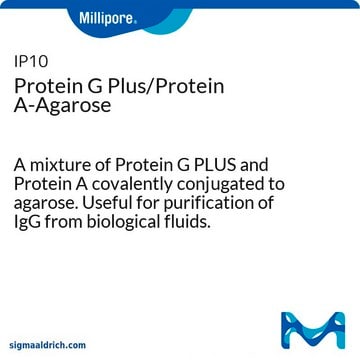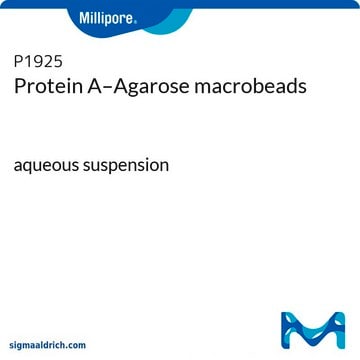PROTAA-RO
Roche
Protein A Agarose
>98% (HPLC and SDS-PAGE), suspension
Synonyme(s) :
agarose, protein a
About This Item
Produits recommandés
Pureté
>98% (HPLC and SDS-PAGE)
Forme
suspension
Conditionnement
pkg of 15 mL (05015979001 [settled resin volume])
pkg of 2 mL (11719408001 [settled resin volume])
pkg of 5 mL (11134515001 [settled resin volume])
Fabricant/nom de marque
Roche
Capacité
>18 mg/mL binding capacity (human IgG (polyclonal))(the IgG is loaded at pH 7.4 and eluted with 200 mM glycine, pH 2.0)
Température de stockage
2-8°C
Catégories apparentées
Description générale
Protein A leakage: <18 ng Protein A/ml (ELISA)
Regeneration: the gel can be used approximately 30 times
Structure: recombinant Protein A (E. coli, Mr = 45,000) is covalently coupled to crosslinked 6% agarose beads: 3 mg Protein A (>98% pure, HPLC, SDS-Page)/1 ml gel
Protein A, immobilized.
Spécificité
Application
Composants
Protein A content: 3 mg/ml pre-swollen gel
Qualité
Autres remarques
Mention d'avertissement
Warning
Mentions de danger
Conseils de prudence
Classification des risques
Eye Irrit. 2 - Flam. Liq. 3
Code de la classe de stockage
3 - Flammable liquids
Classe de danger pour l'eau (WGK)
WGK 1
Point d'éclair (°F)
102.2 °F
Point d'éclair (°C)
39 °C
Certificats d'analyse (COA)
Recherchez un Certificats d'analyse (COA) en saisissant le numéro de lot du produit. Les numéros de lot figurent sur l'étiquette du produit après les mots "Lot" ou "Batch".
Déjà en possession de ce produit ?
Retrouvez la documentation relative aux produits que vous avez récemment achetés dans la Bibliothèque de documents.
Les clients ont également consulté
Notre équipe de scientifiques dispose d'une expérience dans tous les secteurs de la recherche, notamment en sciences de la vie, science des matériaux, synthèse chimique, chromatographie, analyse et dans de nombreux autres domaines..
Contacter notre Service technique









